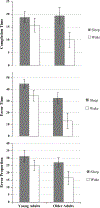Sleep benefits consolidation of visuo-motor adaptation learning in older adults
- PMID: 26563162
- PMCID: PMC6398605
- DOI: 10.1007/s00221-015-4490-7
Sleep benefits consolidation of visuo-motor adaptation learning in older adults
Abstract
Sleep is beneficial for performance across a range of memory tasks in young adults, but whether memories are similarly consolidated in older adults is less clear. Performance benefits have been observed following sleep in older adults for declarative learning tasks, but this benefit may be reduced for non-declarative, motor skill learning tasks. To date, studies of sleep-dependent consolidation of motor learning in older adults are limited to motor sequence tasks. To examine whether reduced sleep-dependent consolidation in older adults is generalizable to other forms of motor skill learning, we examined performance changes over intervals of sleep and wake in young (n = 62) and older adults (n = 61) using a mirror-tracing task, which assesses visuo-motor adaptation learning. Participants learned the task either in the morning or in evening, and performance was assessed following a 12-h interval containing overnight sleep or daytime wake. Contrary to our prediction, both young adults and older adults exhibited sleep-dependent gains in visuo-motor adaptation. There was a correlation between performance improvement over sleep and percent of the night in non-REM stage 2 sleep. These results indicate that motor skill consolidation remains intact with increasing age although this relationship may be limited to specific forms of motor skill learning.
Keywords: Memory consolidation; Motor learning; NREM sleep; Sleep.
Figures




Similar articles
-
Delayed benefit of naps on motor learning in preschool children.Exp Brain Res. 2016 Mar;234(3):763-72. doi: 10.1007/s00221-015-4506-3. Epub 2015 Dec 8. Exp Brain Res. 2016. PMID: 26645305 Free PMC article.
-
Sleep spindles: a physiological marker of age-related changes in gray matter in brain regions supporting motor skill memory consolidation.Neurobiol Aging. 2017 Jan;49:154-164. doi: 10.1016/j.neurobiolaging.2016.10.009. Epub 2016 Oct 11. Neurobiol Aging. 2017. PMID: 27815989
-
Sleep and memory consolidation: motor performance and proactive interference effects in sequence learning.Brain Cogn. 2015 Apr;95:54-61. doi: 10.1016/j.bandc.2015.01.011. Epub 2015 Feb 14. Brain Cogn. 2015. PMID: 25682352
-
Does sleep promote motor learning? Implications for physical rehabilitation.Phys Ther. 2009 Apr;89(4):370-83. doi: 10.2522/ptj.20080310. Epub 2009 Feb 6. Phys Ther. 2009. PMID: 19201986 Review.
-
Adult Gross Motor Learning and Sleep: Is There a Mutual Benefit?Neural Plast. 2018 Aug 13;2018:3076986. doi: 10.1155/2018/3076986. eCollection 2018. Neural Plast. 2018. PMID: 30186317 Free PMC article. Review.
Cited by
-
Role of normal sleep and sleep apnea in human memory processing.Nat Sci Sleep. 2018 Sep 4;10:255-269. doi: 10.2147/NSS.S125299. eCollection 2018. Nat Sci Sleep. 2018. PMID: 30214331 Free PMC article. Review.
-
A Delayed Advantage: Multi-Session Training at Evening Hours Leads to Better Long-Term Retention of Motor Skill in the Elderly.Front Aging Neurosci. 2019 Nov 22;11:321. doi: 10.3389/fnagi.2019.00321. eCollection 2019. Front Aging Neurosci. 2019. PMID: 31824300 Free PMC article.
-
Frontal beta-theta network during REM sleep.Elife. 2017 Jan 25;6:e18894. doi: 10.7554/eLife.18894. Elife. 2017. PMID: 28121613 Free PMC article.
-
Potential Benefits of Daytime Naps on Consecutive Days for Motor Adaptation Learning.Clocks Sleep. 2022 Aug 30;4(3):387-401. doi: 10.3390/clockssleep4030033. Clocks Sleep. 2022. PMID: 36134945 Free PMC article.
-
Dynamics of sleep spindles and coupling to slow oscillations following motor learning in adult mice.Neurobiol Learn Mem. 2019 Dec;166:107100. doi: 10.1016/j.nlm.2019.107100. Epub 2019 Oct 14. Neurobiol Learn Mem. 2019. PMID: 31622665 Free PMC article.
References
-
- Buysse DJ, Reynolds CF, Monk TH, Berman SR, Kupfer DJ (1989) The Pittsburgh Sleep Quality Index: a new instrument for psychiatric practice and research. Psychiatry Res 2:193–213 - PubMed
-
- Doyon J, Penhune V, Ungerleider LG (2003) Distinct contribution of the cortico-striatal and cortico-cerebellar systems to motor skill learning. Neuropsychologia 41:252–262 - PubMed
Publication types
MeSH terms
Grants and funding
LinkOut - more resources
Full Text Sources
Other Literature Sources
Medical

